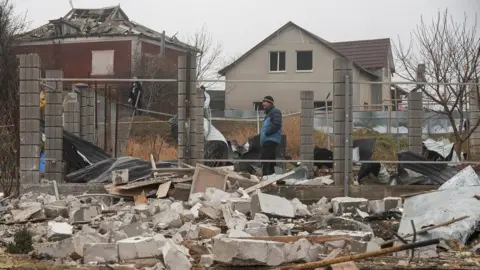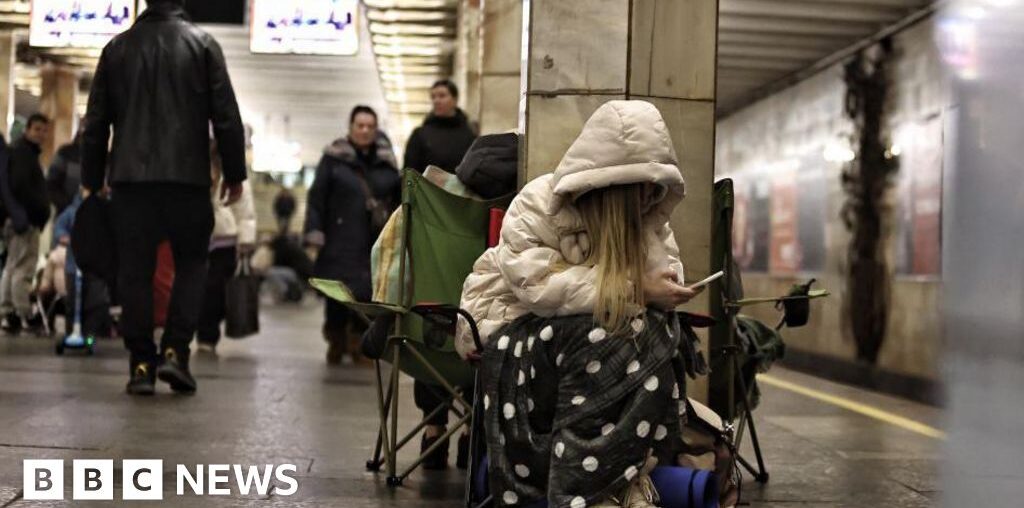 Getty Images
Getty ImagesRussian President Vladimir Putin has threatened to attack decision-making centres in the Ukrainian capital of Kyiv with the country’s new ballistic missile, Oreshnik.
Putin was speaking hours after Russia launched a “comprehensive” strike on Ukraine’s energy grid overnight, in what he called a response to “continued attacks” using US-supplied Atacms missiles on Russian soil.
Ukrainian President Volodymyr Zelensky warned that any “Russian blackmail” would be met with a “tough response”.
Ukraine used Atacms and UK-supplied Storm Shadow missiles to strike inside Russian territory last week for the first time since the full-scale invasion of February 2022, following approval by the Western suppliers, the US, the UK and France.
The overnight Russian strike unfolded over several hours with waves of drones and missiles flying across the length and breadth of Ukraine – the second attack of its kind this month.
There were no fatalities, but it left more than one million people in Ukraine without power.
Zelensky said cluster munitions had been used against civilian and energy infrastructure.
“Cluster warheads [are] a particularly dangerous type of Russian weaponry used against civilians,” he said, adding that they “significantly complicated” the work of rescuers and repair crews.
Putin said the Russia attack involving 90 missiles and 100 drones also included the “Oreshnik” – a new ballistic missile which, according to Putin, cannot be intercepted.
US officials believe Russia is likely only to have a small number of the experimental Oreshnik missiles and would need time to produce more of them.
Responding in his nightly address, Zelensky said Putin “has no interest in ending this war” and sought to “prevent others from ending this war”.
“[His] escalation now is a form of pressure aimed at eventually forcing the president of the United States to accept Russia’s terms.”
The Russian leader also said Moscow would not allow Ukraine to get nuclear weapons, and if it ever did, would use “all means of destruction at Russia’s disposal”, according to Russia’s state-run news agency RIA.
This is thought to be a reference to reports in the New York Times newspaper last week that unnamed Western officials had suggested giving Ukraine nuclear weapons before US President Joe Biden leaves office in January.
Zelensky has also repeatedly complained that the 1994 Budapest Memorandum, by which Ukraine gave up its nuclear weapons inherited from the USSR, had left the country without the necessary security.
 Reuters
ReutersThe Russian attacks caused explosions in several cities, including Odesa, Kharkiv and Lutsk.
Kyiv was also the target of attacks, but Ukrainian authorities say all missiles targeting the capital were intercepted. Kyiv’s military administration said the attack lasted almost nine-and-a-half hours.
At least 12 areas across Ukraine, including three western regions, were hit and Energy Minister Herman Halushchenko said emergency power outages had been introduced.
Elsewhere, the head of the Rivne administration Oleksandr Koval said electricity supplies had been cut to more than 280,000 people in the western region. In the Lviv region, as many as 523,000 homes and businesses were without electricity, according to regional head Maksym Kozytsky. In Kherson, authorities said they could be left without electricity for days.
Ukrainian authorities have responded by implementing pre-emptive emergency power cuts in order to minimise damaging overloads to the country’s grid.
Temperatures are dropping and the country has already experienced its first snowfalls, but the full force of Ukraine’s famously harsh winter has not yet been felt.
Ukrainian officials fear another concerted Russian attempt to deplete the power grid as winter arrives.
They have been warning for some time that Russia has been stockpiling cruise and ballistic missiles in order to launch coordinated and country-wide attacks on Ukraine’s energy system.
Earlier this month, Ukraine’s largest private energy company, DTEK, said its thermal energy plants suffered “significant damage”, resulting in blackouts.
Thursday’s attack was the eleventh “major attack” the country’s energy system had faced since March, DTEK said.
Since Russia’s full-scale invasion of Ukraine, its plants have been attacked more than 190 times.
DTEK added that the European Commission and the US had given them up to €107m (£89m) of equipment aid to restore power.
Having already endured two-and-a-half bitter winters since Russia’s full-scale invasion in February 2022, Ukrainians are bracing themselves for another.


